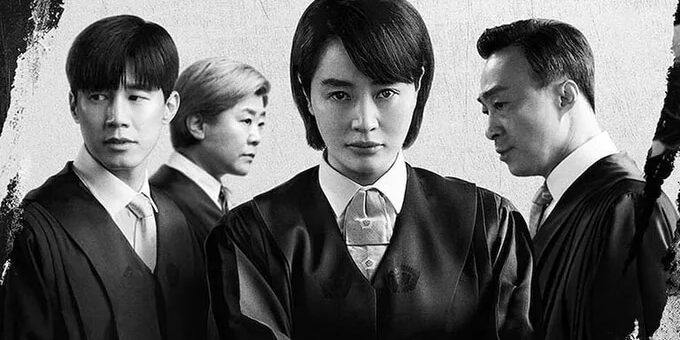If you enjoy oppa piggy-back carrying love triangles or time-traveling romantic comedies, this isn’t the K-Drama for you. If, however, you’re in the mood for a gritty legal drama that doesn’t pull its punches, look no further. The acting is superb and the plots are very realistic. In fact, the cases seemed to be ripped from the headlines, so if you like “Law & Order” type of dramas, you will be hooked. But buckle in because the crimes depicted in “Juvenile Justice” are shocking to the conscience and certainly thought-provoking.
The criminal justice system serves two main purposes: first, to punish the criminal for an offense, or “retribution”; and second, to transform the criminal into a law-abiding, productive member of society, or “rehabilitation.” Oftentimes, the goals of retribution and rehabilitation conflict with one another. The victims and their families may want a pound of flesh or an eye for an eye. While society and perhaps the criminal’s family want a second chance.
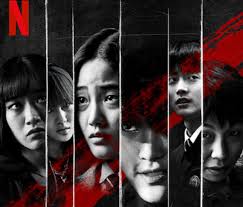
This conflict is heightened when crimes are perpetrated by minors and justice, especially in Korea, often tips in favor of rehabilitation; supporters argue that a minor is too young to know the gravity of the crime, and a young person can change for the better. This tug-of-war between retribution and rehabilitation sets the framework for the Korean drama series, “Juvenile Justice”.
Judges in Opposite Corners
In “Juvenile Justice”, the two leads are judges who personify retribution and rehabilitation.
Judge Shim Eun Seok (played by Kim Hye Soo, an actress known for her roles in “Hyena” and “Signal”) seems to be a cold, harsh jurist, who represents the retribution aspect of the criminal justice system. Early on, she unambiguously states, “I detest juvenile offenders.” She is more concerned about the victims and their families as she adjudicates her cases. This concern is reflected by the fact that she keeps a picture of the victims in front of her while she is working.
On the other hand, Judge Cha Tae Joo is a soft-spoken, compassionate judge who strongly believes in rehabilitation, a belief stemming from his own experience as a youthful offender. After making the most of his second chance, he often puts himself in the shoes of the juveniles; and thus often does not align with his colleague, Judge Shim. They both, however, are passionate about seeking the truth and justice.
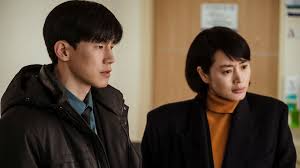
Occupying the middle ground is Senior Judge Kang Won Jung (played by Lee Sung Min, who had notable roles in “Misaeng” and “King 2 Hearts”). Senior Judge Kang feels his hands are tied with the current laws applying to youth offenders and aspires to become an Assemblyman to reform the Juvenile Act. But Judge Kang also deeply believes in rehabilitation and has history with Judge Cha.
Is There Enough Justice in the Juvenile Act?
Throughout the series, a continuing storyline involves the campaign to repeal South Korea’s Juvenile Act. First enacted in 1958, the Juvenile Act afforded tremendous leniency to young offenders whose cases “shall be conducted in a spirit of kindness and gentleness toward the juvenile.” The purpose of the Act is to protect children and rehabilitate them rather than to punish them.
Youthful offenders (under 14) are automatically deemed “protection cases” and exempt from harsh punishment; the maximum possible sentence is two years in a juvenile reformatory. But for the older juvenile offenders (aged 14 to 19), a maximum sentence can be incarceration of 20 years, imposed for more heinous crimes like rape or murder. Critics of the Juvenile Act argue that some adolescents are abusing their status as minors and flaunt their criminal behavior because of the inherent lenient sentencing. Critics contend that such juveniles get a taste for crime as protection cases then graduate to commit more heinous acts after they reach 14 years of age.
“Juvenile Justice”, in a 10-episode first season, consists of six discrete cases involving juvenile crimes. Most of these crimes are based on actual events, with creative license added in for dramatic effect. Some of the scenes and criminal acts are gruesome, which accounts for the mature (TVMA) rating.
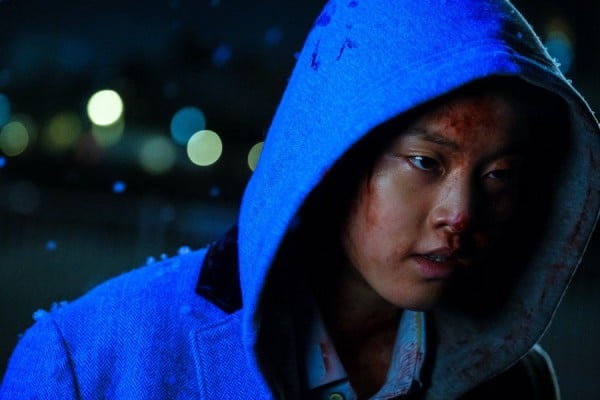
Themes and Episode Guide
The Punishment to Fit the Crime
Episode 1 & 2: One of the most difficult issues facing the juvenile justice system in Korea is whether the young offenders under 14 should be treated so differently from those over 14. The first case is a tough one and involves the brutal murder of a young child. That’s tragedy enough but when the accused offenders are also children, there are no easy answers. What, at first, seems to be an open-and-shut case turns out to be anything but.
And as more discoveries reveal tangled motivations, questions arise to what justice really looks like when mental illness is a factor and there’s such a world of difference when an offender is either younger or older than 14.
Domestic Abuse
Episode 3: The problem of domestic abuse, and the traumatic physical and psychological effects on the juvenile, is the next case on the docket for Judges Shim and Cha. A female teenager is admitted to the hospital because she’s a suspected victim of assault. But complications arise when the judges discover that she’s also on probation for committing serious offenses herself. Will this case force Judge Shim to re-examine her rigid stance that all youthful offenders always deserve punishment?
The Halfway Home – A Better Alternative to Detention?
Episode 4 & 5: Many juvenile offenders are “runaways” who come from broken homes and commit crimes such as prostitution and theft to survive on the streets.
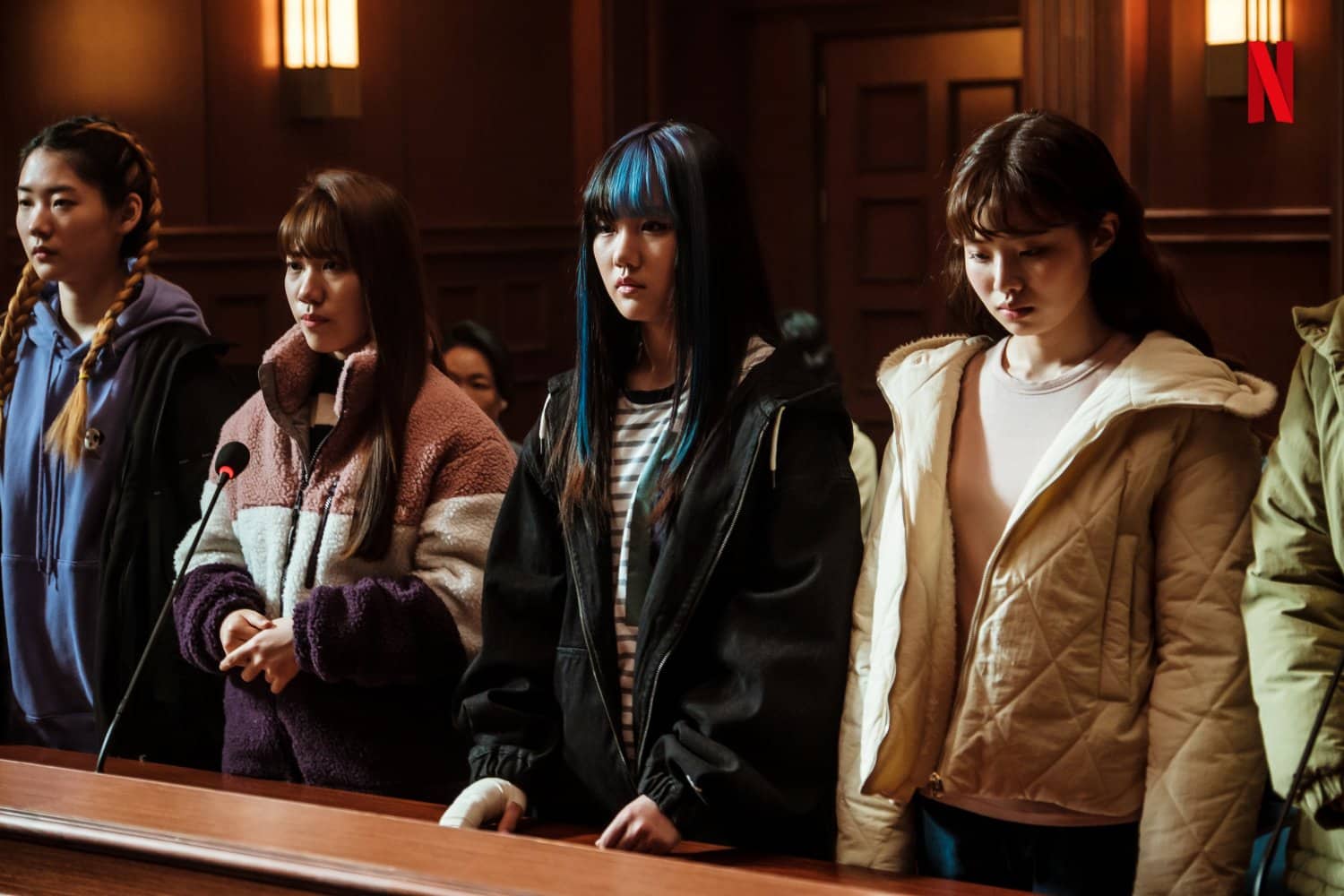
The Pureum Home is one of the very few shelters for juvenile offenders. The Juvenile Court annually inspects the Home but immediately before a scheduled visit, Judges Shim and Cha receive a tip that abuses may be occurring.
A Senior Judge advises judges Cha and Shim to ignore the tip because nothing was confirmed, and an investigation could undermine funding for the Home. But Judges Shim and Cha, nonetheless, look into the allegations and contradicting stories emerge. In the midst of the investigation, Pureum Home closes and it’s uncertain whether its doors will open again.
This case provides insights to the shelter system in Korea, which appears to be severely underfunded by the government. A facility like Pureum Home provides structure and a more rehabilitative environment than detention facilities. However, these shelters can be difficult to manage and operate properly. As the Home’s proprietor remarked, “You must know well that most kids who get sent to us don’t have a good family background. I thought I’d be used to it by now but it’s hard every time.”
Juvenile Justice and the Wealthy
Episode 6: “Juvenile Justice” also tackles the more “white collar” crime of high school cheating. The next case handled by Judges Shim and Cha involved a high school cheating scandal where a group of students were caught receiving answers to a college entrance examination. These students were the children of the most wealthy and powerful members of Korean society.
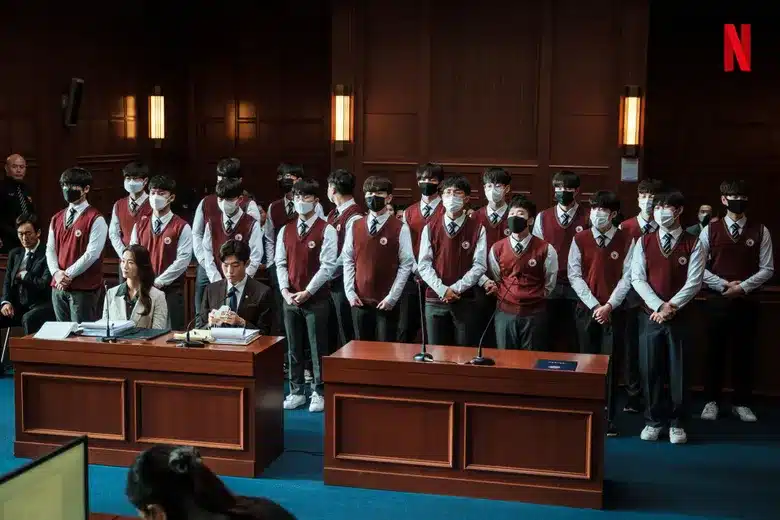
Will the delinquent students’ privilege allow them to an evade meaningful disipline? And if they do emerge unscathed, will any other students be compromised by the cheating students’ actions?
The Fatal Car Accident – Juvenile Bullying
Episode 7 & 8: Bullying by high school students appears to be a pervasive problem. Early on in the first episode, we see that Judge Cha had developed a special rapport with a young offender named Kwak Do Seok. In this episode Do Seok stands accused of using a fake ID to rent a car and going for a joy ride with four other teenagers that ends with deadly consequences. Judge Cha is incredulous that he would get into such trouble, but the rental and subsequent ride hid dark struggles and good intentions unknown by Judge Cha.
Judge Cha is anguished that he once said to Do Seok, “What’s important is that life is a comma, not a period. So you don’t need to be anxious. Anyone can make mistakes. Mistakes do not mean you’ve failed. You can start over again at any time.”
Recidivism – Do Lenient Sentences Create Monsters?
Episode 9 & 10: One of the criticisms of the Juvenile Act is that when young offenders are not punished severely, that criminal behavior accelerates. The last case of “Juvenile Justice” explores the issue of recidivism. Judges Shim and Cha are assigned a case involving the brutal gang rape of a teen-aged girl. With this case, we finally learn why Judge Shim detests juvenile delinquents so much.
Five years after a personal tragedy, Judge Shim faces the youth responsible for the incident. However, DNA collected immediately after the rape incriminate two other juvenile delinquents who eventually confess, and not the offender Judge Shim knew. The new Senior Judge Na Geun Hee assigns Judge Shim to the case involving the two juveniles who confessed to the rape, while Judge Cha would be assigned the accused offender. However, Judge Shim later tells Judge Cha that she will take all the cases.
This perplexes Judge Cha, who does some investigating and discovers the past connection involving Judge Shim. Judge Cha implores Judge Shim to recuse herself due to the conflict of interest, but she adamantly refuses. She is aware of the blatant conflict of interest, but insists on making sure the juveniles do not again get away with their crimes.
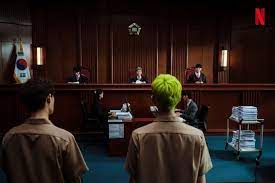
Judge Shim believes that the boys responsible for her tragedy were not meaningfully disciplined by the system and enabled the current rape case before them. Will Judge Shim be able to oversee an unbiased hearing? Will she recuse herself from the case?
Find out on “Juvenile Justice”, now streaming on Netflix.

